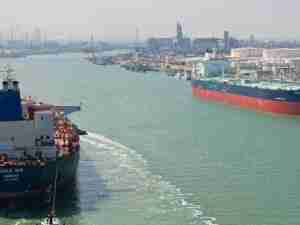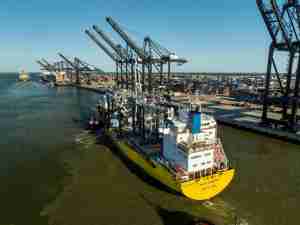Black Sea freeze hitting major ports spurs grain-crunch concern
By: Manisha Jha and Isis Almeida | Jan 12 2017 at 08:46 AM | Ports & Terminals
The cold blast across eastern Europe is raising concerns about a grain-export crunch as icy conditions restrict navigation at some of the region’s most important ports.
Blizzards and gales are curbing movements of vessels at Bulgaria’s Varna port and navigation in the Hungarian part of the Danube river has been suspended. Romania’s major grain-exporting hub of Constanta was disrupted this week and at least three ports in Ukraine’s Odessa region have limited ship maneuvers due to ice.
As forecasters expect another cold spell next week in Ukraine, one of Europe’s top wheat and corn shippers, traders are concerned ports may close again and slow exports. The Black Sea region accounts for about a quarter of the world’s grain shipments and further disruptions may help boost wheat and corn prices that reached multi-year lows in 2016.
“We are expecting these logistical issues to continue in Black Sea ports for next few days,” Wibke Baars, a consultant at Paris-based farm adviser Agritel, said by phone. “If colder conditions continue and it slows loading even more, then we could see an impact on prices.”
Traders are also closely watching weather conditions because severe cold can damage crops during winter dormancy. While temperatures plunged from Russia to Poland, crops have mostly been protected by an insulating layer of snow.
Read more: How Europe’s crops are coping with the latest cold snap.
In Bulgaria, ship movement is suspended in some parts at the port of Varna, while terminals at Burgas have reopened after closing Tuesday, the Bulgarian Ports Infrastructure Co. said Thursday. There’s no information yet that grain exports will be impacted and shipments are taking place as normal, the Agriculture and Food Ministry said.
Romania’s Constanta port reopened Wednesday after being closed overnight.
Ice-related restrictions mean ship loading may be slightly slower in Reni, Izmail and Ust-Dunaysk in Ukraine’s Odessa region, according to a spokesman for the nation’s Administration of Seaports, and the Infrastructure Ministry. Other ports in Bilhorod-Dnistrovskyi, Mykolayiv, and Oktyabrsk have taken similar measures.
In the Hungarian section of the Danube, ice breakers are in use near Gyor by the Austrian border and on the Tisza river close to Szeged near Serbia to clear way for ports, a spokeswoman for the National Water Authority said. Hungary is a large corn producer.
Temperatures may be as much as 20 degrees Celsius (36 degrees Fahrenheit) below normal in parts of eastern Europe next week, said Kenny Miller, a meteorologist at MDA Weather Services.
“This situation is different than last year because we had a mild winter last year and this year we are seeing a normal winter,” Agritel’s Baars said. “It is too early to say the logistics issue is having an impact on prices, but we certainly have to monitor the situation.”
—With assistance from Volodymyr Verbyany Gabriella Lovas and Slav Okov To contact the reporters on this story: Manisha Jha in London at [email protected], Isis Almeida in London at [email protected]. To contact the editors responsible for this story: Lynn Thomasson at [email protected], Nicholas Larkin, Tony Barrett.










